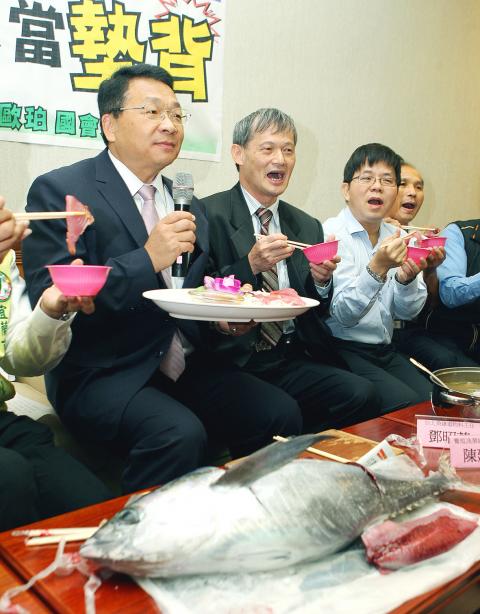Legislators yesterday enjoyed raw fish and freshly cooked fish soup in front of journalists to mitigate the damage over reports of mercury and heavy-metal contamination in the nation’s deep-sea fish stocks.
Democratic Progressive Party (DPP) Legislator Chen Ou-po (陳歐珀) and Chinese Nationalist Party (KMT) Legislator Lin Kuo-cheng (林國正) joined Yilan County fishermen association delegates at a press conference in consuming the delicacies in an attempt to assuage mounting public concerns.
The legislators said many people are no longer buying seafood, which has led to a drastic decline in fish stock prices.

Photo: CNA
At an academic conference last week, a study by clinical toxicologist Wu Ming-ling (吳明玲) of Taipei Veterans General Hospital reported that people who frequently eat deep-sea fish over a long period had elevated mercury levels in their blood and hair, and cited six patients who displayed symptoms of mercury poisoning.
To convince the public, the delegates cut up a 50cm yellowfin tuna and prepared slices of raw tuna sashimi for the legislators to eat, as they also drank fish soup.
After Wu’s report was released, prices had fallen Chen said.
“The price of swordfish was NT$500 per one Taiwanese catty (600g), now it’s NT$250. The dorado dolphinfish price fell from NT$130 to NT$53. Tuna fell from NT$350 to NT$170. Prices have declined by at least half. So how can fishermen make a living?” Chen asked.
He said the researchers based their report of heavy-metal contamination in deep-sea fish on only a few cases and that they failed to specify the species of the fish.
“Would they shoulder responsibility for the economic losses of our fishermen?” he asked.
“I grew up in the fishing port of Wuchi [梧棲, in Greater Taichung], and my family depended on fishing for our livelihood. We had fish for every meal at home, and we are in good health,” Lin said.
He said a 2010 Japanese academic paper in an international fishery journal of a study involving 1,000 individuals did not find any symptoms of mercury poisoning, nor did eating fish cause any harmful health effects.
In response, the head of the hospital’s department of toxicology, Teng Chao-fang (鄧昭芳), said the study pertained to specific cases.
“As long as people have balanced meals and eat in moderation, it is alright to consume deep-sea fish,” Teng said.
Teng said he also likes to eat fish, but because each person’s physiology is different, he is unable to offer a daily recommended limit for the consumption of deep-sea fish.

Taiwan is to commence mass production of the Tien Kung (天弓, “Sky Bow”) III, IV and V missiles by the second quarter of this year if the legislature approves the government’s NT$1.25 trillion (US$39.78 billion) special defense budget, an official said yesterday. Commenting on condition of anonymity, a defense official with knowledge of the matter said that the advanced systems are expected to provide crucial capabilities against ballistic and cruise missiles for the proposed “T-Dome,” an advanced, multi-layered air defense network. The Tien Kung III is an air defense missile with a maximum interception altitude of 35km. The Tien Kung IV and V

The disruption of 941 flights in and out of Taiwan due to China’s large-scale military exercises was no accident, but rather the result of a “quasi-blockade” used to simulate creating the air and sea routes needed for an amphibious landing, a military expert said. The disruptions occurred on Tuesday and lasted about 10 hours as China conducted live-fire drills in the Taiwan Strait. The Civil Aviation Administration (CAA) said the exercises affected 857 international flights and 84 domestic flights, affecting more than 100,000 travelers. Su Tzu-yun (蘇紫雲), a research fellow at the government-sponsored Institute for National Defense and Security Research, said the air

A strong continental cold air mass is to bring pollutants to Taiwan from tomorrow, the Ministry of Environment said today, as it issued an “orange” air quality alert for most of the country. All of Taiwan except for Hualien and Taitung counties is to be under an “orange” air quality alert tomorrow, indicating air quality that is unhealthy for sensitive groups. In China, areas from Shandong to Shanghai have been enveloped in haze since Saturday, the ministry said in a news release. Yesterday, hourly concentrations of PM2.5 in these areas ranged from 65 to 160 micrograms per cubic meter (mg/m³), and pollutants were

Taiwan’s armed forces have established response protocols for a wide range of sudden contingencies, including the “Wan Chun Plan” to protect the head of state, the Ministry of Defense (MND) said today. After US President Donald Trump on Saturday launched a series of airstrikes in Venezuela and kidnapped Venezuelan President Nicolas Maduro, concerns have been raised as to whether China would launch a similar “decapitation strike” on Taiwan. The armed forces regularly coordinate with relevant agencies and practice drills to ensure preparedness for a wide range of scenarios, Vice Minister of National Defense Hsu Szu-chien (徐斯儉) told reporters before a